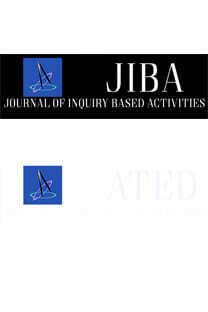BİR FEN BİLİMLERİ ETKİNLİĞİ: NEDEN? NİÇİN? NASIL?
Sorular ve cevaplar eğitim-öğretim ortamının vazgeçilmez unsurlarındandır. Ne ve nerede soruları düşük bilişsel seviyede, niçin ve nasıl soruları ise yüksek bilişsel seviyededir. Bu etkinliğin amacı yüksek bilişsel seviyede sorular aracılığıyla öğrencilerin araştırma-sorgulama becerilerini artırmak ve fen derslerine ilişkin bakış açılarını geliştirmektir. Bu etkinlik 2016-2017 eğitim-öğretim yılı I. ve II. döneminde gerçekleştirilmiştir. Etkinliğe bir Bilim ve Sanat Merkezi'nde fen bilimleri dersine devam eden ortaokul seviyesindeki gönüllü öğrenciler katılmıştır. Neden? Niçin? Nasıl? etkinliği, yarışma olarak düzenlenmiştir. Sınıf panosuna her hafta fen bilimleri dersi ile ilgili bir soru asılmıştır. Verilen bir hafta süre içinde öğrenciler soruların cevaplarını ve isimlerini yazmış oldukları bir kağıdı, panoya asılan kutunun içine atmışlardır. Geliştirilen bir değerlendirme ölçeği ile yapılan değerlendirme sonucunda sorulara en fazla doğru cevap veren öğrenci yarışmayı kazanmıştır. Etkinliğe ağırlıklı olarak kız öğrencilerin katıldığı, katılımcıların araştırma aracı olarak interneti tercih ettikleri görülmüştür
A SCIENCE ACTIVITY: WHY? WHAT FOR? HOW?
The aim of this activity is to improve students' inquiry skills through high cognitive questions and to introduce a new perspective on science courses. This activity was carried out in the first and second semester of 2016-2017 academic year. Volunteer students attending the science course in a Science and Art Center participated in the activity. Why? What for? How? Activity was organized as a competition. A question was put on the pin board each week about science. The students wrote their answers and their names on a piece of paper and then put it in a box attached to the pin board in a week. Students’ responses were evaluated according to an evaluation scale, and the student with the highest score won the competition. It was observed that mainly girls participated in the activity and that the participants preferred the internet as the research tool
___
- Akpınar, Y. (1999). Bilgisayar destekli öğretim ve uygulamalar [Computer supported instruction and implementations]. Ankara: Anı Yayıncılık.
- Bass, J. E. (1972). The development of an inquiry teaching strategy and a teacher training module for elementary science (Final report). Huntsville, Texas: Sam Houston State University.
- Bektaş, M., & Horzum, M. B. (2010). Otantik öğrenme [Authentic learning]. Ankara: Pegem Akademi Yayıncılık.
- Bloom, B. S. (Ed.). Engelhart, M. D., Furst, E. J., Hill, W. H., & Krathwohl, D. R. (1956). Taxonomy of educational objectives, handbook I: The cognitive domain. New York: David McKay Co Inc.
- Büyükalan Filiz, S. (2002). Soru-cevap yöntemine ilişkin öğretimin öğretmenlerin soru sorma düzeyi ve tekniklerine etkisi [The effect of question answer method training given to the teachers on their questioning knowledge and techniques] (Unpublished dissertation). Gazi Üniversitesi, Eğitim Bilimleri Enstitüsü, Ankara.
- Çelik, D. (2000). Okullarda ölçme ve değerlendirme nasıl olmalı? [How should be assessment at schools?] İstanbul: Milli Eğitim Bakanlığı Yayınları.
- Ergin Çetin, E. (2014a). Neden? Niçin? Nasıl? (Mavi) [Why? What for? How? (Blue)]. Ankara: Çocuk Gezegeni Yayınları.
- Ergin Çetin, E. (2014b). Neden? Niçin? Nasıl? (Mor) [Why? What for? How? (Purple)]. Ankara: Çocuk Gezegeni Yayınları. Ergin Çetin, E. (2014c). Neden? Niçin? Nasıl? (Turuncu) [Why? What for? How? (Orange)]. Ankara: Çocuk Gezegeni Yayınları.
- Demirel, Ö. (2009). Öğretim ilke ve yöntemleri öğretme sanatı [Teaching principles and methods the art of teaching] Ankara: Pegem Akademi Yayıncılık.
- Jarrett, D. (1997). Inquiry strategies for science and mathematics learning: It’s just good teaching. Oregon: Northwest Regional Educational Laboratory.
- Koyunlu Ünlü, Z. (2015). Fen ve teknoloji dersinde araştırma-sorgulamaya dayalı öğrenmenin öğretim teknolojileri ile desteklenmesine yönelik bir eylem araştırması [An action research of supporting inquiry learning with instruction technologies in science and technology course] (Unpublished dissertation). Gazi Üniversitesi, Eğitim Bilimleri Enstitüsü, Ankara.
- Martin, R., Sexton, C., Franklin, T., Grlovich, J., & McElray, D. (2005). Teaching science for all children. Boston: Pearson/Allynand Bacon.
- Ministry of National Education. (2013). İlköğretim kurumları (ilkokullar ve ortaokullar) fen bilimleri dersi (3, 4, 5, 6, 7 ve 8. sınıflar) öğretim programı [Foundational education institutions (3, 4, 5, 6, 7, and 8th grades) science curriculum]. Ankara: Talim ve Terbiye Kurulu Başkanlığı.
- Ministry of National Education. (2015). PISA ulusal ön raporu [PISA national preliminary report]. Ankara: Ölçme Değerlendirme ve Sınav Hizmetleri Genel Müdürlüğü.
- Ministry of National Education. (2017). Fen bilimleri dersi öğretim programı (ilkokul ve ortaokul 3, 4, 5, 6, 7 ve 8. sınıflar) [Elementary and middle school (3, 4, 5, 6, 7, and 8th grades) science curriculum]. Ankara: Talim ve Terbiye Kurulu Başkanlığı.
- National Research Council. (2000). Inquiry and national science education standarts. Washington, DC: National Academy.
- Organisation for Economic Co-operation and Development. (2016). PISA 2015 assessment and analytical framework: Science, reading, mathematic and financial literacy. Paris: PISA, OECD Publishing.
- Welch, A., & Huffman, D. (2011). The effect of robotics competitions on high school students’ attitudes toward science. School Science and Mathematics, 111(8), 416-424.
- ISSN: 2146-5711
- Yayın Aralığı: Yılda 2 Sayı
- Başlangıç: 2011
- Yayıncı: Evrim Erbilgin
Sayıdaki Diğer Makaleler
BİR FEN BİLİMLERİ ETKİNLİĞİ: NEDEN? NİÇİN? NASIL?
BİLİMİN DOĞASI İÇERİK TEMELLİ ETKİNLİK ÖRNEĞİ: ABUR CUBUR
FERAH ÖZER, NİHAL DOĞAN, GÜLTEKİN ÇAKMAKCI, OSMAN SERHAT İREZ, YALÇIN YALAKİ
WHICH ONE IS MORE BEAUTIFUL? CREATIVE ARTS VERSUS STEREOTYPED ART ACTIVITIES
SCIENCE AND ENGINEERING IMPLEMENTATION: A CASE STUDY ON EDIBLE AND RENEWABLE CAR ACTIVITY
